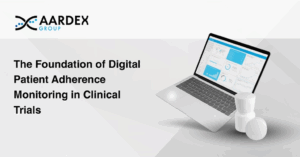Realizing the potential of the revolution in cancer treatment depends on ensuring researchers, regulators, and clinicians have access to all the information they need to develop, approve, and prescribe new drugs – including patient adherence data.
Nothing stops a drug from working like not taking it as prescribed, yet a recent study of pivotal oncology clinical trials that found a third did not even mention adherence in the literature. In addition, there was wide-spread variation in how those that did report on patient adherence behaviors described and presented the data. It is a trend that leaves a host of unanswered questions that could hinder the shift towards personalized medicine.
Why Does Patient Adherence Matter?
The field of oncology is undergoing a rapid change with the advent of personalized approaches, such as gene, cell, and immunotherapies, leading to a ground change in how people are treated.
It is also changing how drugs are developed and delivered. When applied to the new, generally well tolerated generation of drugs, the chemotherapy-era ethos of delivering as high as dose as the patient can tolerate can result in excessively high and unnecessarily costly dosing.
It makes establishing optimum, more precise dosage patterns an essential part of the clinical research pathway, and adherence to the protocol as fundamental to study success as randomization.
Sub-optimal patient adherence, even in just one arm of a clinical trial, introduces variability that can lead to the overestimation or underestimations of drug efficacy, while negatively impacting on the validity of results and on safety. It can significantly drain study power, rendering painstaking cohort size calculations useless and leading to the need for expensive re-recruits.
While none of this is news to the research sector, non-adherence is an enduring problem. A review of adherence behaviors among children with acute lymphoblastic leukemia, for example, found that 40% had suboptimal adherence, leading to a significant increase in relapse rate.1
The true picture, however, could be even starker than these figures suggest, as patient adherence is not routinely reported along with results – despite this information playing a central role in informing statistical analyses, supporting trial interpretation, and guiding the appropriate selection of adherence strategies for future trials and clinical practice.
As the authors of a study published in the European Journal of Hospital Pharmacy earlier this year stated, the accurate reporting of data in properly designed randomized clinical trials improves the correct interpretation of scientific medical papers. “But medication adherence is often under-reported, even in the field of oncology,” they added.2
The study
Lasala et al’s paper, Medication adherence reporting in pivotal clinical trials: Overview of oral oncological drugs, set out to assess how and to what extent adherence to medication is reported in pivotal oncology clinical trials.
All drugs authorized by the European Medicines Agency from 1 January 2014 to 31 December 2019 were considered for the study, which analyzed 56 clinical trials involving 30 drugs. For each article, researchers extracted the journal of publication, phase of the study, posology, whether adherence was mentioned within the main text or additional material, and, if so, the terms in which the adherence was reported.
Of the articles, 11 (19.6%) contained a mention of medication adherence in the main document, and 26 (46.4%) in the supplementary material. However, 19 (33.9%) did not contain any reference to medication adherence at all.
The researchers also found huge variance in the way adherence was reported. There were discrepancies in language, with some papers using “compliance” and others “adherence”, as well as in the definitions of adherence thresholds used. Some, for example, set the required adherence requirement at 75%, whereas others put it at 80%.
“Thus, a varied framework of reporting, definitions and measurements of adherence emerges, which is probably based more on arbitrary estimates of the authors of the clinical trial than on evidence-based data,” said the authors.
“Incomplete or inconsistent reporting in clinical trials has a negative impact on patient care and in general on research, because to understand and interpret the results of a study it is necessary that the data are reported thoroughly and consistently and with complete transparency.”
Accurate reporting
The consequences of a lack of adherence during a clinical trial can be serious. It can lead to therapeutic failure or less than expected efficacy, both of which may lead to higher doses than those included in the drug’s label being considered. This puts patients at a greater risk of adverse events while driving up the cost of these already expensive treatments.
“It is, therefore, necessary to assess adherence objectively and not just by asking patients to self-assess,” said Lasala et al.
However, most of the articles that report the methods to measure medication adherence use pill count, but the authors suggest using other, more reliable methods, such as digital monitoring software.
This echoes an article published in eClinical Medicine in 2019, which argued that digital adherence monitoring during clinical drug trials was a prerequisite for personalised medicine. Systems that combine connected packaging, to record dose administration, and data analytics, to identify erratic dosing patterns, provide holistic, accurate measurements upon which to base complex, individual clinical decisions, it said.3
“Personalised medicine is slowly becoming reality,” said the authors, “this cannot be implemented without proper insights into medication adherence.”
Future records
Lasala et al concluded that adherence data should be included among the minimum set of recommendations in reporting health research, and points to efforts to standardize the measurement of adherence across clinical trials.
One such example is the Medication Adherence Reporting Guideline (EMERGE) which was published by the International Society for Medication Adherence (ESPACOMP) in 2018.4
It proposes four minimal reporting criteria related to the three phases of adherence (i.e., initiation, implementation, and persistence), the operational definition and measurement of each of these phases, and the results from each of these phases. It also includes 17 additional items that the consensus group felt reflected best reporting practice in the different sections of a research paper.4
Global regulators are also taking steps to recognize the importance of accurate adherence reporting during clinical trials. EMA recommendations, for example, call for “consideration of the importance of accurately defining and recording non-adherence events and their cause”, whereas the FDA suggests “identifying and selecting the most likely adherent patients and encouraging them to perform better”.2
In addition, the International Committee for Harmonization’s E9(R1), Addendum on estimands and sensitivity analysis in clinical trials to the guideline on statistical principles for clinical trials, calls on researchers to minimize protocol violations and deviations, and study withdrawals, and non-adherence.5
Conclusion
Patient adherence data is essential to the interpretation of study findings. It informs the assessment of clinical trial efficacy and safety data and helps clinicians understand optimum dosing levels.
Despite this, the data is not routinely published. If it is to rise to the challenge of implementing personalized medicine in a safe and effective manner, the oncology sector needs to accept the requirement and start working towards a standard framework, such as that set out in EMERGE.
References:
- Bhatia, S., Landier, W., Hageman, L., Chen, Y., Kim, H., Sun, C. L., … & Relling, M. V. (2015). Systemic exposure to thiopurines and risk of relapse in children with acute lymphoblastic leukemia: a Children’s Oncology Group Study. JAMA oncology, 1(3), 287-295.
- Lasala, R., Santoleri, F., Romagnoli, A., Abrate, P., Musicco, F., & Costantini, A. (2022). Medication adherence reporting in pivotal clinical trials: overview of oral oncological drugs. European Journal of Hospital Pharmacy.
- Zijp, T. R., Mol, P. G., Touw, D. J., & van Boven, J. F. (2019). Smart medication adherence monitoring in clinical drug trials: a prerequisite for personalised medicine?. EClinicalMedicine, 15, 3-4.
- De Geest, S., Zullig, L. L., Dunbar-Jacob, J., Hughes, D., Wilson, I. B., & Vrijens, B. (2019). Improving medication adherence research reporting: ESPACOMP medication adherence reporting guideline (EMERGE). European Journal of Cardiovascular Nursing, 18(4), 258-259.
- ICH. (2019). Addendum on estimands and sensitivity analysis in clinical trials to the guideline on statistical principles for clinical trials. E9 (R1). Step, 4, 20.



